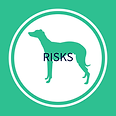A Thoughtful Start to Finding Your Lost Dog
Staying Calm: The Key to Finding Your Lost Dog
Introduction:
Losing a dog is a heart-wrenching experience, one that can send even the calmest of minds into a frenzy of worry and panic. It's natural to be overcome with emotion, but in these critical moments, keeping a level head is the most valuable asset you can possess.
The Power of Calmness:
Above all else, remember that staying calm is your superpower. Your dog, whether nervous, shy, friendly or a seasoned escape artist, relies on your steady guidance and reassurance in times of crisis.
The Logical Approach:
As the initial shock of realising your dog is missing sets in, it's crucial to switch gears from emotion to logic. A scattergun approach—frantically searching without a plan—can lead to confusion and missed opportunities.
The Value of a Logical Plan:
Instead, focus on creating a logical plan. Start by gathering information about your dog's behaviour, their last known location, and any sightings. Documenting these details can provide a foundation for an effective strategy. They give you a basis to assess the facts to enable you to make wise decisions. Note that posting such facts on social media may not be the best action to take in the first instance.
Removing Emotion:
While it's impossible to completely remove emotion from such a situation, strive to keep it in check. Emotional decisions can lead to unintended consequences, like scaring your dog further away.
The Best Chance for Success:
By maintaining a calm, logical approach, you're affording your lost dog the best possible chance of being found safely. Remember, your determination, patience, and clear thinking will be your most potent tools in the quest to reunite with your beloved companion
When it comes to helping your lost dog, there are fundamental steps to kickstart your efforts. It's important to remember that not all dogs are the same, and understanding your dog's unique needs is paramount. If your lost companion happens to be a nervous dog, rescue dog, or an ex-street dog, their behavior may differ significantly from other dogs. For tailored guidance on helping these special pups when they're lost, head over to our dedicated "Nervous Dogs" article.
If you find yourself reading this, it's likely that you've already reached out on social media seeking assistance for your lost dog. Undoubtedly, you've received a flood of well-intentioned advice from the public, suggesting various organisations to contact. However, it's crucial to pause and evaluate the expertise of these individuals in your specific lost dog situation. How experienced are they? What qualifications do they possess to recover your lost dog? What tools are at their disposal, and what affiliations do they have with the recommended groups? Unfortunately, the world of lost dogs is often murky and unregulated, allowing for the establishment of well-meaning but potentially ill-equipped dog search and rescue groups on social media. Despite their claims of being free, many teams operate on donations, raising questions about the motivations behind their assistance – is it a genuine commitment to helping, or is money a driving factor? It's essential to approach these situations with discernment and prioritise the safety and well-being of your lost pet.

Reach out to your dog's microchip provider to request that your pet be marked as lost and verify the accuracy of your contact information. If you're uncertain about the microchip number, get in touch with your veterinarian for assistance. If you're unsure about the registration details, click here for more information.
For dogs recently arriving from outside the UK, contact Petlog to register the microchip and inform them about your missing dog. Reach out to your rescue organisation for additional support. It's essential to note that your dog's microchip number should not be shared publicly.
.png)
Ensure that access to your home or the location where your dog went missing is available to your lost pet. Dogs, even in unfamiliar areas, often possess an uncanny ability to find their way back to something familiar, be it home, a friend's place, or even a spot from a routine walk. Imagine yourself lost; you'd seek out something you recognise, and lost dogs do the same.
To improve the chances of your dog finding their way back, ensure that someone is present at the location. Keep the doorways unobstructed, allowing easy access, do not leave your dogs bedding outside.
Don't be alarmed if your dog doesn't return immediately; they need time to assess their situation and strategise their return. If people are in the way, your dog is less likely to come back promptly.
If your dog went missing during a walk, instead of wandering too far, return to the spot where you last saw them and wait patiently. If you drove to the area, keep an eye on the car park and remain there. Sometimes, you might have to wait until it gets quieter, which may mean waiting until it gets dark. Encouraging people to search the area can often deter your dog or make them wait until everyone leaves before attempting to reunite. Make it as simple as possible for them to find their way back to you!
Denying your dog this opportunity can lead to significant problems. It's essential to distinguish between a lost dog and a loose dog, as they are not one and the same. Dogs often exhibit more intelligence than we give them credit for.
.png)
Controlling how you communicate about your lost dog is crucial for effective management of the situation. Begin by crafting a single social media post on your own profile and share it with local groups and pages, including a readily available contact number. It's vital to advise people not to chase your dog, as this can induce stress and provoke them to flee.
Remember that not all dogs require an immediate search effort, and sometimes posting on social media may not be the best initial choice. It's a delicate balance, and you should carefully assess what's safest for your dog.
Please be aware that there are individuals with malicious intentions targeting lost dog owners. They may call and either claim to have your dog, demanding money, or falsely assert that your dog is deceased. It's important not to engage with them. If a phone number is involved, pass this information on to the police, and never send any money.
Once you've posted on social media, you'll receive a multitude of advice. It's your responsibility to discern between helpful and unhelpful advice. You can find further guidance in our Knowledge Articles. Remember that more advice is not necessarily better, and it's crucial to adopt a logical approach early on. Understanding the difference between sightings and containment is also vital.
If you do choose to post on social media, ensure that you manage the situation effectively to maximise the chances of reuniting with your lost dog.
.png)
At every stage of your dog's disappearance, conducting a risk assessment is essential, and proactive measures should be taken to mitigate these risks as they arise. Begin by assessing environmental risks, and remember to reevaluate them each time your lost dog is sighted.
If your dog is in proximity to a railway line, promptly call 0345 711 4141 to alert them about your lost dog. Similarly, if your dog is near a main road, contact 0300 123 5000, or dial 999 if your dog is actually on the main road. Exercise caution when mobilising search efforts near hazardous areas.
If your dog is in flight mode and tends to flee from people, sending search parties close to risks like a railway line may inadvertently drive your dog onto the very thing you want to avoid.
Additionally, make sure to inspect water bodies, such as swimming pools and ponds, urgently, especially if your dog has not been seen for 4 to 5 days after going missing.
The other crucial aspect of risk assessment pertains to understanding your lost dog and their unique characteristics.
This nuanced assessment, often overlooked, is an art that many search and rescue teams fail to execute effectively. Consider factors such as your dog's age, medication needs, whether they are a nervous young dog lacking street skills, or if they have a lead attached. Addressing these questions and conducting a comprehensive risk assessment is vital before embarking on any search actions.
.png)
While sightings can provide valuable information for most lost dogs (although there are times when no sightings are acceptable and not a cause for immediate concern), it's crucial to understand how to handle them properly.
It's also important to recognise that sightings are distinct from the ability to contain a lost dog.
Sightings should undergo a rigorous risk assessment and review, ideally by experienced individuals who can determine whether responding to the sighting's location would likely have a positive or negative impact on your dog.
Just because your dog has been spotted doesn't necessarily mean they are ready to be caught at that moment. Hastily rushing to sightings can often yield no results. This isn't a matter of "doing nothing"; it's about employing a logical and strategic approach.
Accurate sighting information is of utmost importance. If your dog appears to be getting closer to home, the best course of action is to stay put and request that people LEAVE YOUR DOG ALONE to allow them the space and opportunity to find their way back home on their own terms.
.png)
An essential lesson for every dog owner revolves around understanding the concept of Survival Mode or Fight or Flight Mode. This innate response exists in every dog, and it's your duty as a responsible owner to recognise and comprehend it, particularly if your dog happens to be in this mental state when they become lost. Learn about Survival Mode in lost dogs here.
Always keep in mind that your lost dog holds great significance to you, and with that significance comes the responsibility to quickly educate yourself about lost dogs. After gaining this knowledge, you can make informed decisions regarding what is best for your dog. It's perfectly acceptable to adjust your strategies as needed, and it's crucial to recognise when your current approach isn't yielding any progress in capturing your dog. In such cases, be prepared to change tactics to increase the likelihood of a successful reunion.
